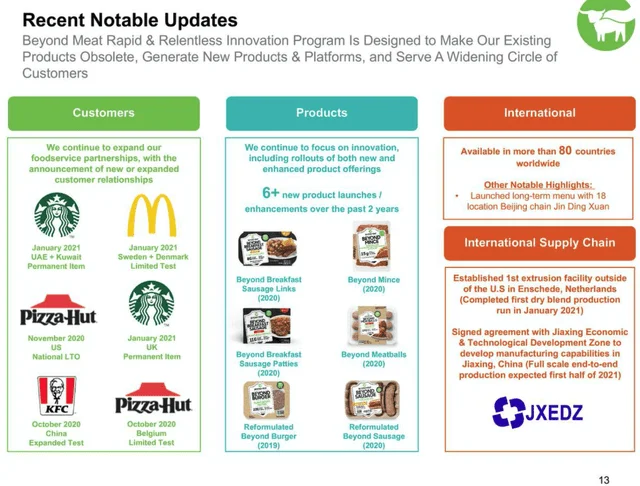So, you bought $1,000 of Beyond Meat stock five years ago? Congratulations, you can now afford a Venti latte and maybe a biscotti. Your investment is worth a whopping $4.28. Let that sink in. This isn't just a stock drop; it's a complete and utter public execution of a Silicon Valley darling. And the best part? The CEO is blaming a "cultural moment."
Give me a break.
When your company’s stock, which once soared to nearly $235 a share, is now trading for less than a pack of gum, you don’t get to blame the "zeitgeist." That’s like a washed-up ‘90s rock band blaming Spotify for the fact that nobody wants to hear their one-hit wonder anymore. The problem isn't the platform, guys. The problem is you only had one good song, and people are sick of it.
Beyond Meat’s story is a classic tale of hype outrunning reality. They rode the wave of eco-conscious, health-forward, tech-bro optimism all the way to a spectacular IPO in 2019. The media loved them. Restaurants were tripping over themselves to get a piece of the action. We were all told this was the future of food. But what happens when the future tastes kind of... mediocre and costs twice as much as the past?
People go back to eating burgers. Real ones.
The Great Dilution Con
The news that Beyond Meat’s stock collapses after debt deal is a masterclass in corporate self-destruction. Faced with declining sales and a mountain of debt, Beyond Meat's brilliant solution was to strike a deal that involved issuing up to 326 million new shares. To put that in perspective, that’s more than four times the number of shares that existed before.
This isn't a debt restructuring; it's a surrender. It's the financial equivalent of setting your own house on fire to collect the insurance money, only to realize you forgot to pay the premium. For any poor soul still holding onto their stock, this move was a dagger to the heart. Your slice of the pie didn't just get smaller; the entire pie was thrown into a woodchipper. And for what? To kick the can down the road while the company continues to hemorrhage cash, losing $29.2 million in a single quarter.

I mean, who in their right mind thought this was a sustainable plan? Did they really believe the initial hype from 2019 would last forever? It feels like the entire strategy was built on vibes, on the idea of plant-based meat being cool, rather than the reality of making a product people consistently want to buy when a cheaper, better-tasting alternative is right next to it in the grocery aisle. It's the Fyre Festival of food companies—great marketing, spectacular failure in execution.
The company has, offcourse, been laying people off and even hired a "chief transformation officer." What does that even mean? It sounds like a title you give someone when you have no idea how to fix the company but need to look like you're doing something. It's corporate theater, and the audience has already walked out.
"A Headwind of Misinformation"
This is my favorite part. When confronted with the fact that people are increasingly wary of highly processed foods, CEO Ethan Brown blames a "headwind of misinformation," supposedly pushed by the big, bad meat lobby. It's a bold strategy, Cotton. Let's see if it pays off for him.
Blaming "misinformation" is the last refuge of a company that has lost the argument. People aren't avoiding your pea-protein pucks because of some shadowy conspiracy. They're avoiding them because they’ve tried them, looked at the price tag, and decided, "Nah, I'm good." Consumers are smarter than you think. They can tell when something is a premium product and when it's just premium-priced.
This is a bad product. No, 'bad' doesn't cover it—this is a product that completely misread its own market. It was a novelty, a fun thing to try once. It was never going to be a staple. And now, with inflation squeezing everyone's wallets, who is going to pay three to four times more for a plant-based burger that, let's be honest, still doesn't quite hit the mark on taste? The answer is written in 67-cent stock certificates.
Brown says the "extreme nature of the current renaissance around animal protein will... moderate." He’s waiting for a cultural shift, for droughts or disease outbreaks to make his product relevant again. This isn't a business plan; it's a prayer. It’s sitting in a flooding basement and hoping it stops raining instead of fixing the leak. And honestly, I just can't...
What does it say about our investment culture that this company was ever valued in the billions? Are we just that desperate for a story, for a "megatrend," that we're willing to ignore fundamental business realities like profit and consumer demand? Then again, maybe I'm the crazy one here. Maybe the real money was made by the insiders who cashed out at $235 a share, leaving the rest of us to pick through the wreckage.
The Fake Meat Fad Is Officially Over
Let's call this what it is: the end of an era. The plant-based gold rush is over. Beyond Meat wasn't a revolution; it was a fad, propped up by venture capital and a media narrative that wanted a hero in the fight against climate change. But you can't build a lasting business on good intentions and press releases. You need a product that people actually want to buy, again and again. Beyond Meat never really had that. It had a moment. And as its stock chart proves, that moment has passed.
